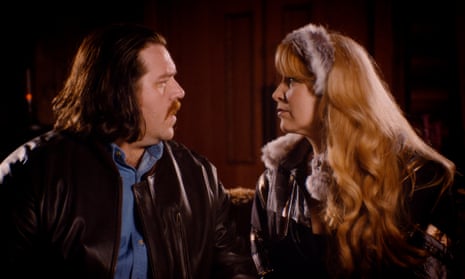In a 1997 essay, David Foster Wallace aligned himself against writers regularly called out for their misogyny, dubbing John Updike, Philip Roth and Norman Mailer as “the Great Male Narcissists”. But 20 years later, the content of Wallace’s books, scrutinised in tandem with his readership, leaves the work vulnerable to similar questions. Wallace, it seems, is now the mascot for a new generation of male narcissists.
In her recent essay Men Recommend David Foster Wallace to Me, Deirdre Coyle recalled reading David Foster Wallace’s Brief Interviews with Hideous Men for the first time. She admired much of it, but said it “feels bad to read a book by a straight cis man about misogyny … This is par for the course, when the course is reading books and the par is the western canon.”
I’m not here to debate whether Wallace was a misogynist. What interests me is this: even if you can be as nuanced and sensitive in your literary presentation of misogyny, like Wallace is in Brief Interviews and in his essay on porn, Big Red Son, is this enough? Should men even write about misogyny – and can they do so without perpetrating it?
Many writers now often considered misogynist once thought themselves to be skewering misogynist hypocrisy. With The Rachel Papers, Martin Amis successfully depicted a romantically and intellectually cruel young man, and Money was brilliant because of Amis’s characterisation of John Self: unforgivably glutinous and misogynist – but also warm. But by London Fields, Amis was seduced by his own male gaze: the hypersexualised Nicola Six may have her creator’s wit and knowledge of Joyce and Beckett (as well as Updike, Mailer, and Roth), but even her literary knowledge is marshalled towards dwelling on how good she is at kissing and sex (mainly sodomy, in which she “would be perfectly prepared to represent her century”). It’s rare that you’re in the head of a character who, while not being an authorial stand-in, is so clearly an authorial patsy. Subsequent books have only revealed how hard Amis seems to find writing women who aren’t vamps, frumps, or members of his own family.
Roth’s Portnoy prides himself on appearing respectable, as a lawyer working on racial equality initiatives – but he denigrates and humiliates women, in and out of the sexual arena, only referring to his lover as “the Monkey” and frequently mocking her over signs of her inferiority, such as poor spelling. Even as a lover of Roth and Portnoy’s Complaint, I find it impossible to deny that it embeds these prejudices. Similarly, writing about Nabokov in Men Explain Lolita to Me, Rebecca Solnit finds that it “inculcate[s] denigration”. As Solnit explained, “omnipresence of men raping female children as a literary subject” could never be “a pleasure” to her in the way Nabokovians believe the book should be relished, because it “can have the cumulative effect of reminding women that we spend a lot of our lives quietly, strategically trying not to get raped”.
As a critic and a writer, I am curious to know what male authors who are feminists can do to address misogyny. How can men write honestly about the bad behaviour of men, without it being a busman’s holiday for female readers? These days, I feel all authors have a duty to write about misogyny, especially men. We may not have been on the receiving end of it, but we have experienced guilt about it. Most of us have probably felt guilty about misogynist behaviour at some point in our lives, and will at some point have attempted to exorcise or deny any remnants of ingrained chauvinism. Men are experts in misogyny; after all, we invented it. It is ubiquitous: even writing the previous sentence, I could easily be accused of mansplaining misogyny.
One of the most successful dissections of misogyny by a male author I have read is Teju Cole’s Open Cities. On the surface it is about a mild-mannered doctor, Julius, who loafs about the US and Europe. At the end, almost as an aside, we learn that a woman he knows has just confronted him about raping her when he was 16 years old. It is devastating and powerful, especially as the narrator is shocked and has no memory of it. The truth of the accusation is – narrative-wise – ambiguous, but by making us doubt the accuser by default, the narrative cleverly replicates misogynous thinking. Two years ago, I spoke to Cole about that scene and he said it was essential that Julius had done this, and that the reader comes to this conclusion, too.
But I can’t say for sure how male authors successfully avoid perpetrating misogyny. I’d like to learn, though, and I’d like it to be an open discussion. An answer to improving the standard of male writing about gender, or at least correcting tired approaches, might be something Megan Nolan half-jokingly posed in a Vice article about the Bad Sex awards. “Where,” she asked, “are the awards for the Worst Sensitive Young Man Portrayal?”
Nolan’s point was more illustrative than earnest. But the idea of highlighting examples and challenging writers, so that the overall quality of their work improves is something that could work, opening up the discourse rather than shutting it down. Other than that, I’m open to ideas.

Comments (…)
Sign in or create your Guardian account to join the discussion